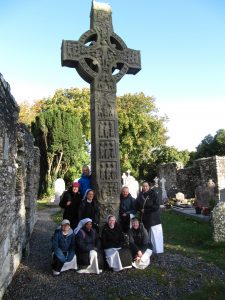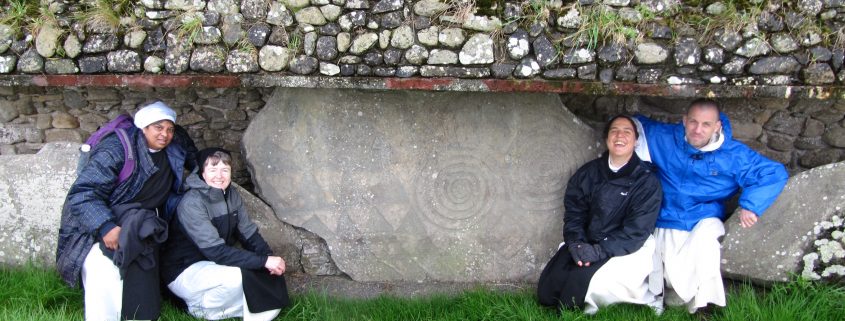Region of the Isles Junior Seminar 2022
This year’s in-person gathering of juniors in the Region of the Isles had originally been scheduled to take place at Mellifont Abbey in 2020 only to be postponed due to the pandemic to the ‘safe’ end of this year, autumn 2022. Yet unfortunately some in Mellifont Abbey got the Covid virus just days before we were due to travel there and the course had to be relocated to Mount St Joseph Abbey Roscrea. We would very much like to thank both Mellifont Abbey for all their preparations, and Mount St Joseph Abbey for finding room for us at the last minute! This unexpected turn of events proves that we are blessed with a lively spirit of hospitality in our region!
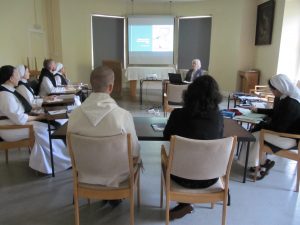
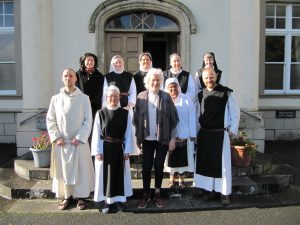
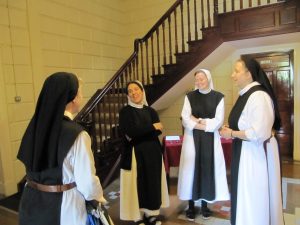
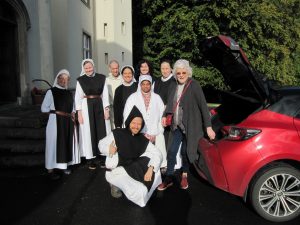
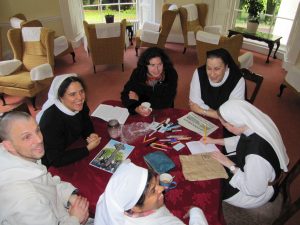
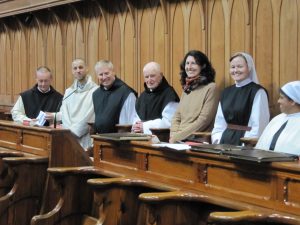
The seminar, presented by scripture scholar Margaret Daly Denton, was entitled ‘Listening with the Ear of an Earth-Caring Heart: Reading St John’s Gospel in the light of the Ecological Crisis’. Before the course began we were treated to a tour of the centuries-old enclosed garden in the grounds of the Abbey that the students of Cistercian College Roscrea have been working hard bringing back to life. The juniors were also given a guided tour of the prayer walk through the woods created by the students which had been conceived and designed by Fr Aodhán and Paddy Smyth, a member of staff at Cistercian College Roscrea. These outdoor facilities have been an invaluable spiritual resource for the local people and all visitors to the Abbey, particularly during the pandemic. For the purposes of our junior seminar, we couldn’t have asked for a better prelude to the scripture seminar with its ecological theme than this outdoor experience in the grounds of the Abbey.
Margaret began her presentation developing the theme of creation in John’s Gospel by focusing on the importance of gardens both in the ancient near east and in John’s Gospel, exploring their deeper biblical meaning. Gardening, caring for the earth, is a primary human task in biblical thought. Adam’s role in the garden of Eden was to care for the garden, to till the ground. Because of sin, in the story of Cain and Abel the ground is cursed and no longer yields, something that we can see throughout the contemporary world.
The people of Israel associated gardens with Eden and had a strong sense of living in banishment from the garden of Eden. Restoration in Jewish thought – contemporary with Jesus and with the writing of the Gospel – was very often described as a restoration or readmission to the garden of Eden, the earth that had been ravished becoming again like the garden of Eden. Jesus, the evangelist of the fourth Gospel tells us, often met with his disciples in the garden and Margaret drew out the symbolism of that choice of location; Mary Magdalene ‘supposed him to be the gardener’ in the resurrection narrative. When the risen Jesus appears in the garden, he signals a renewal of all creation. This new creation inaugurated by the incarnation is further expressed through Jesus’ identification with bread and water, “I am the bread of life” (Jn 6:35), “Let anyone who is thirsty come to me and drink. Whoever believes in me, as Scripture has said, rivers of living water will flow from within them” (Jn 7:37).
John’s Gospel needs to be read and re-read, Margaret reminded us, at both a literal and symbolic level, to capture its range of irony and profundity of meaning. Her lectures demonstrated the importance of a broader knowledge of the scriptures underlying this Gospel, a breadth of knowledge of the scriptures that she herself admirably displayed in her conferences together with her creative powerpoint presentation including inspiring images, video and music to further illustrate her deeply engaging teaching.
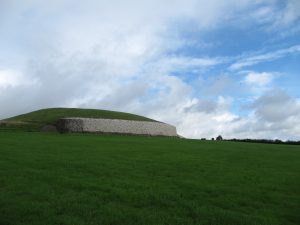
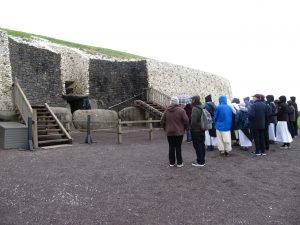
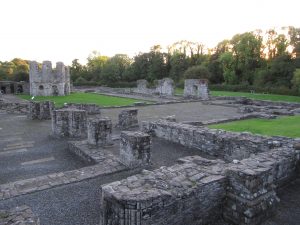
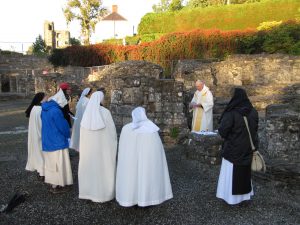
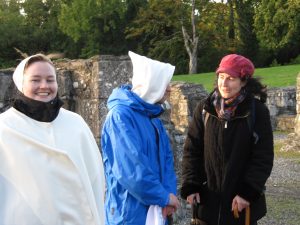
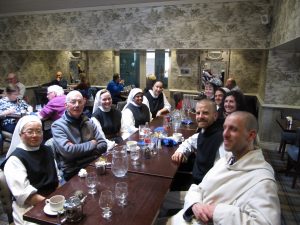 During the week the juniors took a day trip, beginning with a tour of Newgrange and Knowth, the world heritage megalithic tombs in Co. Westmeath dating from 3,200 bc. Following the tour we had an enjoyable dinner together, followed by a visit to Monasterboice, a sixth century Celtic monastic site, one of over 200 Celtic monastic ruins located throughout Ireland. We prayed the office of None beside one of the famous 1,000 year old high crosses on the site. Then we drove just ten minutes further up the road to the substantial remains of Old Mellifont Abbey, the first Cistercian foundation made in Ireland in 1142. This new monastery from the continent was considered huge to the Celtic Christians in its day. There we celebrated an evening Mass in the ruins of the church presided by Fr Aodhán, a monk from Roscrea who had joined us on our trip, before heading back to Roscrea for the remainder of the course.
During the week the juniors took a day trip, beginning with a tour of Newgrange and Knowth, the world heritage megalithic tombs in Co. Westmeath dating from 3,200 bc. Following the tour we had an enjoyable dinner together, followed by a visit to Monasterboice, a sixth century Celtic monastic site, one of over 200 Celtic monastic ruins located throughout Ireland. We prayed the office of None beside one of the famous 1,000 year old high crosses on the site. Then we drove just ten minutes further up the road to the substantial remains of Old Mellifont Abbey, the first Cistercian foundation made in Ireland in 1142. This new monastery from the continent was considered huge to the Celtic Christians in its day. There we celebrated an evening Mass in the ruins of the church presided by Fr Aodhán, a monk from Roscrea who had joined us on our trip, before heading back to Roscrea for the remainder of the course.
We enjoyed so much meeting with and joining the monks for the Divine Office and community Eucharist in the Abbey church during our few days at Roscrea. The monastic friendship and hospitality of the monks and the guesthouse staff was superb, so warm and welcoming…it was hard to say goodbye! We keep each other in prayer as each one’s formation journey continues.
